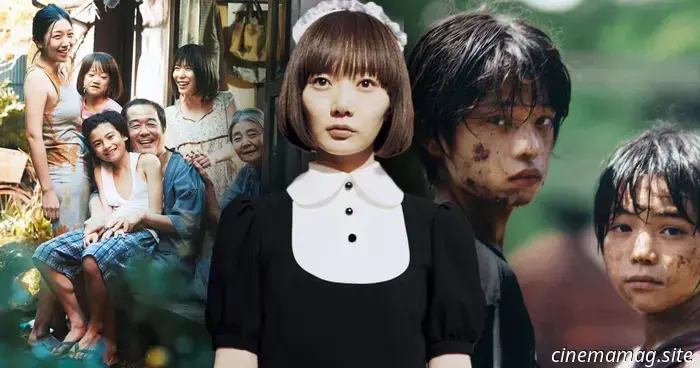
The Must-See Films of Hirokazu Kore-eda
It's time to explore the works of a contemporary master in Japanese cinema and beyond: the essential Hirokazu Kore-eda films. Often regarded as the natural successor to Yasujiro Ozu, this director may not be well-known to Western audiences, but you might have encountered one or two of his more widely known films.
Hirokazu Kore-eda, similar to Ozu, focuses on telling subtle, reflective, and deeply human narratives. His films often explore themes such as family relationships, moral complexities, grief, societal class, Japanese culture, conformity, and more.
Kore-eda's protagonists frequently exist within contexts where various existential challenges arise. He seamlessly navigates between melodrama and a more subdued realist drama, tackling stories that courageously confront difficult moral questions.
However, Kore-eda distinguishes himself from Ozu by venturing beyond traditional cinema into more unconventional or darker realms. He isn't hesitant to explore fantasy elements and has also made films outside of Japan.
He ranks among the greatest working directors, continually demonstrating that his remarkable skill has not diminished. Here are some of the essential Hirokazu Kore-eda films.
**Maborosi**
Let's start with Kore-eda's debut feature, *Maborosi*. He made a strong impression with this poignant and introspective examination of grief. Critics and film enthusiasts took notice early on, as the film was nominated for the Golden Lion at the Venice Film Festival.
The story follows a young woman (Makiko Esumi) who is devastated when her husband unexpectedly takes his own life. Years later, now in a new relationship and living in a different place, she grapples with unresolved grief and struggles to understand why her husband chose to end his life. The film is beautifully shot and unobtrusive in its portrayal of the protagonist, laying the foundation for much of Kore-eda's future work. His approach emphasizes showing rather than telling, resulting in films that are often quiet, thoughtful, and incredibly compelling with powerful emotional impacts.
**After Life**
Kore-eda's subsequent feature took a different direction, delving into human emotions and connections (and their severance) with a more philosophical and poignant fantasy element.
As suggested by the title, *After Life* explores what comes after death, set against a rather unremarkable office setting where recently deceased individuals are asked to select a single memory from their lives to carry with them for eternity. The film elicits profound contemplation from viewers, prompting introspection as we ponder that very question. The narrative primarily revolves around the two counselors overseeing this process, with their developing reactions to each case becoming just as captivating as the deceased reflecting on their memories. The unscripted responses from some interviewees further enhance the film's emotional depth.
**Nobody Knows**
At this stage in his career, it became challenging to pinpoint Kore-eda's particular strength. In addition to the previously mentioned works, he had also created *Distance*, which tackled darker themes while revisiting grief from a more communal perspective. *Nobody Knows* shifts focus to neglected children and society's unseen outliers.
A single mother leaves her children, each from different fathers, to fend for themselves for extended periods. The 12-year-old Akira assumes the heavy burden of responsibility, particularly for a much younger sibling, as they struggle financially in an increasingly deteriorating apartment. While the film's premise may sound grim, Kore-eda masterfully tells a heartbreaking, dramatic story infused with universal truths, showcasing the joy and resilience children can find amidst desperate circumstances. Even as the narrative becomes crushingly poignant, it also contains lighter moments until Kore-eda inevitably reveals the heartbreaking reality, which is especially impactful given that it's based on true events. His ability to elicit exceptional performances from child actors is unmatched.
**Air Doll**
Often regarded as a lesser film in Kore-eda's oeuvre, *Air Doll* is a whimsical and satirical work that still poses deeper existential inquiries. Featuring Korean actress Doona Bae, the film follows a lonely man's sex doll that magically comes to life and gains self-awareness.
As she starts to experience the joys and wonders of life, she begins to question her existence. Although it may not reach the emotional intensity of Kore-eda's best works, it's refreshing to see him create a lighter and more playful narrative. Bae's performance is particularly captivating, presenting more depth than one would expect from a mannequin.
**Still Walking**
This film embodies Ozu's influence, illustrating the quiet complexities of familial dysfunction and the cultural emphasis on traditions over resolutions. It's subtly observational yet skillfully melodramatic.
Kore-eda's storytelling is organic, often achieving the perfect balance that each film and character require. This Ozu-inspired family drama is perhaps the path most traversed by Kore-eda, allowing him to effortlessly shift between heartbreaking and uplifting themes within the same film, beautifully affirming the dualities of life's experiences.
**









Other articles
 Comic Book Sneak Peek – Vampirella Helliday 2025 Special
Dynamite Entertainment embraces the holiday spirit this week with the launch of Vampirella Helliday 2025 Special, and you can catch an early look at the issue in the official preview provided below… In the aft…
Comic Book Sneak Peek – Vampirella Helliday 2025 Special
Dynamite Entertainment embraces the holiday spirit this week with the launch of Vampirella Helliday 2025 Special, and you can catch an early look at the issue in the official preview provided below… In the aft…
 Blockchain Gaming Website USA 2026: Leading Crypto Casinos & Bitcoin Betting Platforms - MovieMaker Magazine
Our analysts evaluated over 20 crypto casinos to identify the most secure platforms that offer generous bonuses, swift Bitcoin payouts, and verifiably fair gaming for 2025.
Blockchain Gaming Website USA 2026: Leading Crypto Casinos & Bitcoin Betting Platforms - MovieMaker Magazine
Our analysts evaluated over 20 crypto casinos to identify the most secure platforms that offer generous bonuses, swift Bitcoin payouts, and verifiably fair gaming for 2025.
 Hellboy becomes part of Boss Fight Studio's Immortal Champions action figure series.
Boss Fight Studio has revealed that Hellboy will be included alongside Conan and Red Sonja in its new Immortal Champions action figure series, featuring a 5.5" scale, retro-inspired version of the legendary Dark Horse character.
Hellboy becomes part of Boss Fight Studio's Immortal Champions action figure series.
Boss Fight Studio has revealed that Hellboy will be included alongside Conan and Red Sonja in its new Immortal Champions action figure series, featuring a 5.5" scale, retro-inspired version of the legendary Dark Horse character.
The Must-See Films of Hirokazu Kore-eda
It's time to explore the contemporary genius of Japanese (and beyond) cinema by examining the key films of Hirokazu Kore-eda. Frequently regarded as the successor to Yasujiro Ozu, this filmmaker may...
